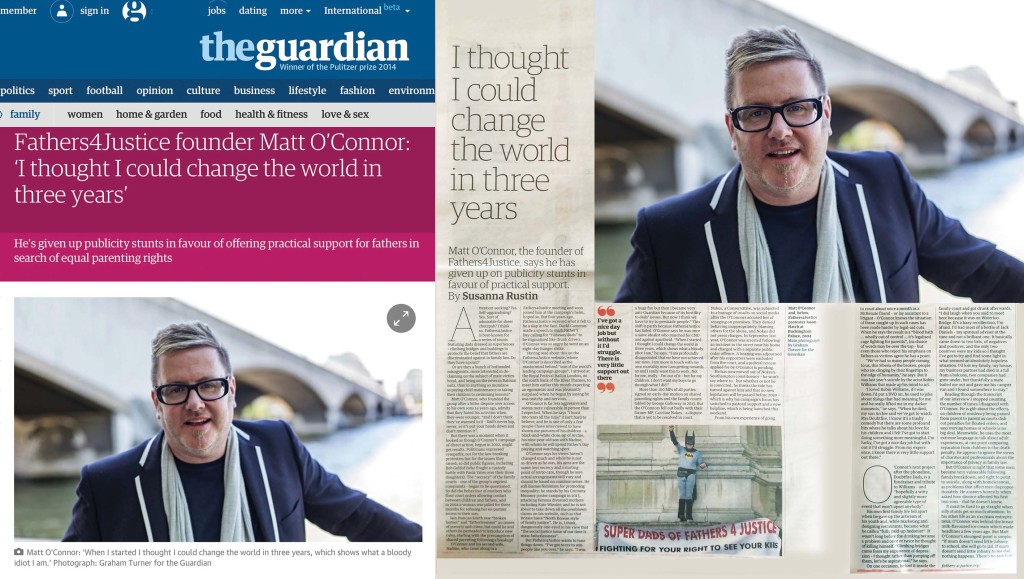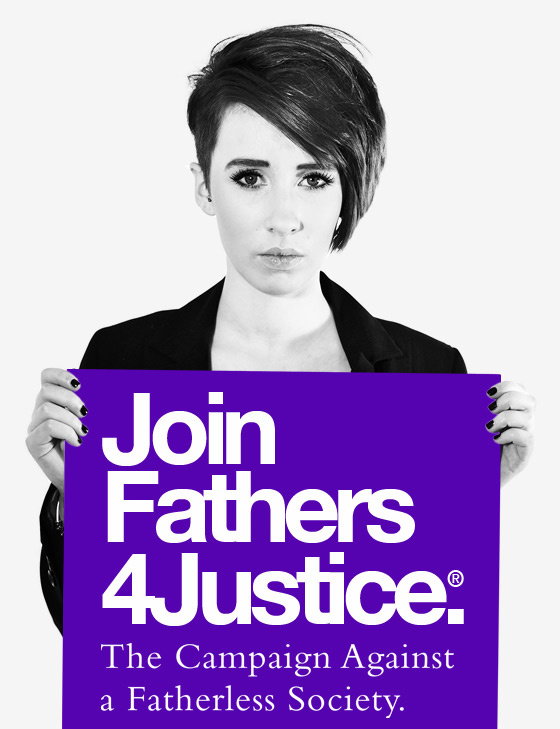The Guardian interview with F4J founder Matt O’Connor: ‘I thought I could change the world in three years’
Attention-seeking? Yes. Self-aggrandising? Yes. Sort of admirable for sheer chutzpah? I think so. Fathers4Justice is best-known for a series of stunts featuring dads dressed as superheroes – climbing bridges and buildings to promote the belief that fathers are discriminated against in family law. Do they have a point?
Or are they a bunch of hotheaded misogynists, more interested in declaiming on the subject of male victimhood, and being on the news in Batman suits, than in anything so mundane as paying child maintenance or taking their children to swimming lessons?
Matt O’Connor, who founded the group after a bitter dispute over access to his own sons 14 years ago, admits that they hated his activism when they were younger, “and I don’t think they’ve warmed to it – Dad’s never hip, never, so it’s put your heads down and don’t mention it”.
But there was a moment when it looked as though O’Connor’s campaign of direct action, begun in 2002, might get results. Politicians expressed sympathy, not for the law-breaking protesters but for the issues they raised; so did public figures, including Bob Geldof (who fought a custody battle with Paula Yates over their three daughters). The “secrecy” of the family courts – one of the group’s angriest complaints – began to be questioned. So did the behaviour of mothers who flout court orders allowing contact between children and fathers, and in 2004 a woman was jailed for three months for refusing her ex-partner access to their son.
Iain Duncan Smith saw “broken homes” and “fatherlessness” as causes of poverty and crime, but could he and others be persuaded to introduce new rules, starting with the presumption of shared parenting following a breakup?
O’Connor and his second wife, Nadine, who came along to a Fathers4Justice meeting and soon joined him at the campaign’s helm, hoped so. But four years ago, Fathers4Justice received what it felt to be a slap in the face. David Cameron made a speech to mark Father’s Day calling for “runaway dads” to be stigmatised like drunk drivers. O’Connor was so angry he went on an eight-day hunger strike.
Having read about this on the Fathers4Justice website, where O’Connor is described as the mastermind behind “one of the world’s leading campaign groups”, I arrived at the Royal Festival Hall in London, on the south bank of the River Thames, to meet him earlier this month expecting an egomaniac and was pleasantly surprised when he began by saying he was twitchy and nervous.
O’Connor is far less aggressive and seems more vulnerable in person than I expected. When he says “I burst into tears all the time” it isn’t hard to believe; and he is one of only a few people I have interviewed to have shown me pictures of his children – a black-and-white close-up of Archie, his nine-year-old son with Nadine, with whom he will spend Father’s Day playing and watching sport.
O’Connor says his views haven’t changed much and while he is not as driven as he was, his aims are the same: less secrecy and a starting-point of 50/50 care, though he says actual arrangements will vary and should be based on common sense. He still blames feminism for promoting inequality; he stands by his Crummy Mummy poster campaign in 2013, attacking famous divorced mothers including Kate Winslet; and he is not about to take down all the overblown claims on his website, such as that Britain has a “North Korean style of family justice”. He is, I think, dangerously one-eyed in his view that “the social justice issue of our time is mass fatherlessness”.
But Fathers4Justice wants to tone things down. “I’ve got to try to win people like you over,” he says. “I was a huge fan but then I became very anti-Guardian because of its hostility to dads’ issues. But now I think we have to try to persuade people.” This shift is partly because Fathers4Justice has failed. O’Connor says he was once a naive idealist who marched for CND and against apartheid. “When I started I thought I could change the world in three years, which shows what a bloody idiot I am,” he says. “I am profoundly disappointed that we have not achieved our aims. I am more in touch with my own mortality now I am getting towards 50 and I really want this to work. Not for me, really – I’m out of it – but for my children. I don’t want my boys to go through what I did.”
More than 100 MPs of all parties signed an early-day motion on shared parenting rights and the family courts tabled by George Galloway in 2013. But the O’Connors fell out badly with their former MP, Caroline Nokes – a dispute that is yet to be resolved in court. Nokes, a Conservative, was subjected to a barrage of insults on social media after the O’Connors accused her of reneging on promises. They denied behaving inappropriately, blaming others for the abuse, and Nokes did not press charges. In September last year, O’Connor was arrested following an incident in the street near his home and charged with a separate public order offence. A hearing was adjourned after his supporters were excluded from the court, and a judicial review applied for by O’Connor is pending.
He has now moved out of Nokes’s Southampton constituency – he won’t say where to – but whether or not he is convicted, he thinks the tide has turned against him and that no new legislation will be passed before 2020 – which is why his campaign’s focus has switched to pastoral support and a new helpline, which is being launched this weekend.
From his own experience of going to court about once a month as a McKenzie friend – or lay assistant to a litigant – O’Connor knows the situation of those caught up in such cases has been made harder by legal-aid cuts. When he says the result is a “blood bath … wholly out of control … it’s legalised cage fighting for parents”, his choice of words may be over the top – but even those who reject his emphasis on fathers as victims agree he has a point.
“We’ve had so many people coming to us, this Siberia of the broken, people who are clinging by their fingertips to the edge of humanity,” he says. But it was last year’s suicide by the actor Robin Williams that made up his mind to act.
“I loved Robin Williams, if I was down I’d put a DVD on, he used to joke about things that had meaning for me and he really lifted me in my darker moments,” he says. “When he died, my son Archie said we’ve got to watch Mrs Doubtfire. I know it’s a trashy comedy but there are some profound bits where he talks about his love for his children and I felt I’ve got to start doing something more meaningful. I’m lucky, I’ve got a nice day job but without it I’d struggle. From my experience, I know there is very little support out there.”
O’Connor’s next project after the phoneline, Doubtfire Dads, is a fundraiser and tribute to Williams – and “hopefully a witty and slightly more agreeable type of event that won’t upset anybody”.
His own first family life fell apart when he gave up the activism of his youth and, while marketing and designing restaurants, became what he calls a “fully paid-up hedonist”. It wasn’t long before the drinking became a problem and once or twice he thought of killing himself. “Climbing bridges came from my experience of depression – I thought rather than jumping off them, let’s be aspirational,” he says.
On one occasion, he lost it inside the family court and got drunk afterwards. “I did laugh when you said to meet here because it was on Waterloo Bridge. It’s a hazy recollection, I’m afraid. I’d had most of a bottle of Jack Daniels – my spiritual adviser at the time and not a brilliant one. It basically came down to two lists, of negatives and positives, and the only two positives were my kids so I thought I’ve got to try and find some light in what seemed an absolutely hopeless situation. I’d lost my family, my house, my business partner had died in a fall from a balcony, two companies had gone under, but thankfully a mate bailed me out and gave me his camper van and I found somewhere to stay.”
Reading through the transcript of our interview I stopped counting the number of times I disagreed with O’Connor. He is glib about the effects on children of residency being passed from parent to parent as courts dish out penalties for flouted orders, and says moving homes or schools is no big deal. Meanwhile, he uses the most extreme language to talk about adult experiences, at one point comparing separation from children to the death penalty. He appears to ignore the views of charities and professionals about the importance of privacy in family law.
But O’Connor is right that some men become very vulnerable following family breakdown, and right to point to suicide, along with homelessness, as problems that affect men disproportionately. He answers honestly when asked how divorce affected his first two sons – that he doesn’t know.
It must be hard to go straight when silly stunts get so much attention. In his other life as an icecream entrepreneur, O’Connor was behind the breast milk-flavoured ice cream that made headlines a few years ago. But his strongest point is simple: “If mum doesn’t send little Johnny to school, she will go to jail. If mum doesn’t send little Johnny to see dad, nothing happens. There’s no sanction.”



